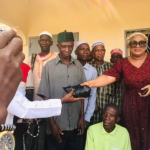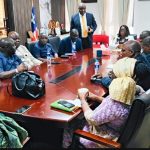The Assets Recovery and Property Retrieval Core Taskforce has submitted and yielded to the petition for a writ of prohibition prayed for by Gracious Ride to the Supreme Court of Liberia, with a pledge that the authority of the courts and appropriate laws will be applied in consonance with due process and the rule of law.
Recently, the Assets Recovery Taskforce confiscated several vehicles belonging to Gracious Ride Group of Companies, owned by the former Chief of Protocol for the Executive Mansion, Ambassador Nora Finda Bundoo, requesting that she provides proof of ownership of the vehicles.
It was alleged that the vehicles were donated by the Japanese government through the Ministry of Foreign Affairs during the George M. Weah administration.
However, the Manager of the company, Francis T. Blamo, filed a petition for a writ of prohibition, at which time the Justice in Chambers, Yussif D. Kaba, cited the Assets Recovery Taskforce to a conference on Monday, April 1, 2024, in regards to the matter. At the same time, the court ordered the taskforce to release all the seized vehicles and stay all seizure pending the outcome of the conference.
During the conference, lawyers representing the management of Gracious Ride argued that the taskforce did not have the legality to make inquiry of petitioner’s title documents and to pack their vehicles for verification.
In a response to the court dated April 8, 2024, the Asset Recovery Taskforce said its action was not deliberate to disenfranchise the petitioner (Gracious Ride), but was done to investigate the allegation of suspicion surrounding the acquisition of the vehicles, and that the investigation of the “suspicious asset” falls within the mandates of Executive Order #126, which was announced by His Excellency Joseph Nyuma Boakai.
However, the taskforce submitted and yielded to the petition in part—that it did not have the legal rights to make inquiry for the petitioner’s title documents and to seize the vehicles—and vowed that, henceforth, the authority of the courts and appropriate laws will be applied in consonance with due process and the rule of law.
The taskforce then informed the court that it reserves its right, under the law to proceed with legal investigation.
Based on the taskforce’s communication, in which it yielded to the petitioner’s claim, the court declined to issue the writ prayed for by the petitioner, reserving the rights to the respondent to proceed in keeping with law.
legal luminaries have interpreted the court’s decision of declining to issue the writ of prohibition as not giving the taskforce the right to seize Gracious Ride’s vehicles; instead, it gives the taskforce the go-ahead to continue its presidential mandate but through due process and the rule of law.
They say the taskforce had previously illegally seized properties belonging to private citizens, and a writ of prohibition would have put a complete halt to the function of the taskforce; therefore, even though the taskforce cannot illegally seize any property, including the vehicles of Gracious Ride, it has the right to use the legal means to implement its mandate for which it was established.
They said the court’s intervention was necessary, as the taskforce’s action has the propensity of causing undue problems and traffic in the streets of Monrovia.






